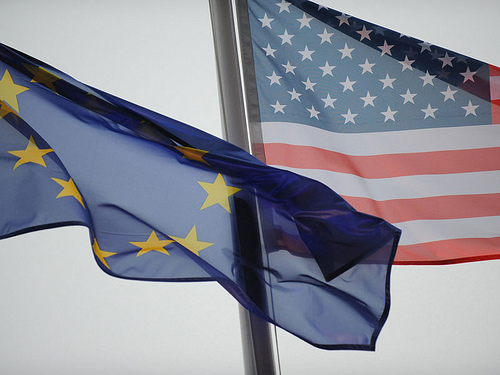
NATO and Russia discuss terrorism and missile defense, German and Dutch parliaments renew Afghanistan commitments, and discussion of the Euro takes center stage at Davos.
HEADLINES:
German Parliament Votes to Extend Afghanistan Mandate (Spiegel Online)
The German parliament votes to extend the German mission to Afghanistan for one year. This mandate however includes a potential drawback date, one which the opposition warn must be adhered too.
France backs wall project at Greece-Turkey border (EurActiv)
Speaking in Athens yesterday (27 January), French Interior Minister Brice Hortefeux has backed a project to build a 12.5km wall at a critical section of the Greece-Turkish border.
Speaking at a press conference with his Greek host, Immigration Minister Christos Papoutsis, Hortefeux signalled that a decision had been taken to build the fence, which would reportedly be similar to one in Ceuta, a Spanish enclave in Morocco.
Italy calls for EU crisis mission, as Egypt boils over (EUobserver)
Italy has said the EU should send a crisis mission to north Africa, as Egypt orders a security crackdown ahead of mass anti-Mubarak rallies on Friday (28 January).
Speaking in the Italian senate on Thursday, Italian foreign minister Franco Frattini said the EU should send a high-level "political support team" to calm tensions in Algeria, Egypt, Tunisia and other countries in the region hit by deadly civil unrest in recent days.
NATO, Russia vow unity on terrorism, disagree on shield (AFP)
NATO and Russia vowed Wednesday to stand side-by-side against terrorism after Moscow’s airport bombing but remained at odds over cooperation on a missile shield for Europe’s population.
Russian and NATO military brass met at the Western alliance’s headquarters in Brussels in the latest chapter in thawing ties between the former Cold War foes following Russia’s 2008 war with Georgia.
Dutch MPs Give Afghan Mission Go-Ahead (Radio Netherlands Worldwide)
The Dutch parliament has decided to go forward with a renewed police training mission to Afghanistan. The mission will involve 545 personnel in Kabul and Kunduz.
Sarkozy insists Paris and Berlin will never abandon the euro (Deutsche Welle)
French President Nicolas Sarkozy rejected speculation over the future of the euro on Thursday, adding that France and Germany were committed to the common European currency.
"To those who would bet against the euro, watch out for your money because we are fully determined to defend the euro," Sarkozy told delegates at the World Economic Forum in Davos. "Mrs. Merkel and I will never – do you hear me, never – let the euro fail."
Davos 2011: Lagarde considers bigger euro rescue fund (BBC News)
The European Union’s financial bail-out fund – used to rescue the Irish Republic – could be enlarged, the French finance minister says.
Irish PM to dissolve parliament on Tuesday: report (Reuters)
Irish Prime Minister Brian Cowen will dissolve parliament on Tuesday and announce the date of a general election, state broadcaster RTE said on Friday, in which his ruling Fianna Fail party will likely suffer a heavy defeat.
Albanian opposition holds anti-gov’t demonstration (AP)
Tens of thousands of Albanians holding flowers and candles marched silently through Albania’s capital Friday in a peaceful anti-government demonstration to honor three opposition supporters shot dead during a protest last week.
EDITORIALS AND COLUMNS:
The Realist Prism: A ‘Greater Atlantic Community’ for a G-Zero World (World Politics Review)
Ian Bremmer and David Gordon, of the Eurasia Group, do not sugar-coat the shape of the new world order emerging in the 21st century. They starkly note:
For the first time since the end of World War II, no country or bloc of countries has the political and economic leverage to drive an international agenda. The United States will continue to be the only truly global power, but it increasingly lacks the resources and domestic political capital to act as primary provider of global public goods. There are no ready alternatives to U.S. leadership.
Russia’s Struggle Against Terror and Itself (The Atlantic)
The floor at Moscow’s Domodedovo airport was still littered with blood and body parts when President Dmitry Medvedev met with members of the Federal Security Service on Monday night. The bomb explosion hours before, which killed 35 people and injured more than 100, was an "atrocious crime," a somber Medvedev said. "Our society and our state have been issued a brutal challenge."
A brutal challenge it is – a new challenge it is not. But it’s something that neither Medvedev nor heavy-handed predecessor Vladimir Putin, now prime minister, have had much success addressing. The root problems might go deeper than either terrorism or separatism, to the core of Russia’s being: an imperial past and a corrupt present.
An Orchard of Ills (The Economist)
The standoff between President Karzai and the incoming Afghan parliament, although moving forward, presents major challenges to the so called progress described by General Petraeus and Liam Fox.
Lessons in Britain’s Iraq war experience (The Australian)
The Chilcot inquiry into the Iraq war, running since July 2009, was set up to identify lessons from the Iraq conflict.
China is no white knight for euro (Korea JoongAng Daily)
While signaling appreciated support for the euro, these bond purchases are mainly symbolic gestures.
Compiled with the assistance of Klée Aiken.
Image: transatlantic.jpg
